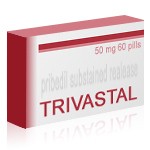Lowered Cognitive Functions in Elderly Patients


Aging is a natural biological process that affects all systems of the human body, including the brain. Among the most concerning changes for patients and caregivers alike are those that impact cognitive functions. The gradual decline of memory, reasoning, problem-solving skills, and other mental faculties in older adults not only affects quality of life but also increases dependence on others. Understanding the nature of cognitive decline in the elderly, recognizing the signs, and exploring treatment options, including pharmacological aids such as Trivastal, are essential for providing effective care and support.
Cognitive Function Decline in the Elderly
Cognitive functions refer to the mental capabilities that involve knowledge, attention, memory, judgment, reasoning, problem-solving, decision-making, comprehension, and language. With aging, it is common to experience a decline in some of these areas, but the extent and speed of decline can vary widely among individuals. This decline may be part of normal aging or may indicate the onset of neurodegenerative disorders such as Alzheimer’s disease or vascular dementia.
Normal age-related cognitive decline typically includes slower information processing, reduced mental flexibility, and mild forgetfulness. However, significant or rapid deterioration often signals a pathological process requiring medical evaluation. Structural and biochemical changes in the aging brain, including reduced synaptic density, decreased neuroplasticity, and neurotransmitter imbalances, contribute to these cognitive changes.
Signs of Cognitive Decline in the Elderly
The earliest signs of cognitive decline may be subtle and easily dismissed as normal aging. However, consistent patterns or a worsening trend should raise concern. One of the first indicators is often memory impairment, particularly in forming new memories or recalling recent events. Difficulty finding the right words, losing track of conversations, or repeating oneself can also suggest declining cognitive abilities.
Disorientation is another common symptom. Elderly individuals may get lost in familiar places or forget the date and time. Problems with executive function manifest as difficulty planning tasks, following instructions, or making decisions. Changes in mood or personality—such as increased irritability, apathy, or withdrawal — can accompany cognitive decline, sometimes preceding noticeable memory problems.
Judgment may also become impaired, leading to poor financial decisions or neglect of personal hygiene and safety. In more severe cases, individuals may have trouble recognizing familiar people or objects, which can be particularly distressing for caregivers and loved ones.
How to Help the Elderly with Cognitive Decline
Support for elderly individuals experiencing cognitive decline should be multifaceted, involving medical, psychological, social, and environmental strategies. Early diagnosis is crucial, as it allows for the implementation of interventions that can slow progression and improve quality of life. A comprehensive evaluation by a healthcare professional, including neuropsychological testing and brain imaging, can help identify the underlying cause and guide treatment.
Cognitive training and rehabilitation programs aim to enhance memory, attention, and problem-solving skills. These may include structured exercises, puzzles, and the use of memory aids like calendars or voice reminders. Physical activity is also beneficial, as it improves cerebral blood flow and supports neuroplasticity.
Creating a structured and supportive environment is key. Establishing daily routines, simplifying tasks, and reducing distractions help maintain independence and reduce anxiety. Emotional support from family, friends, and professional caregivers is vital, as depression and social isolation can exacerbate cognitive problems.
Nutrition plays a critical role. Diets rich in omega-3 fatty acids, antioxidants, and vitamins—particularly the Mediterranean diet—have been linked to better cognitive health. Avoiding alcohol and managing cardiovascular risk factors such as hypertension, diabetes, and high cholesterol are also essential components of care.
Cognitive Changes in the Elderly
Cognitive aging does not affect all domains of mental function equally. Episodic memory, which involves recalling specific events or experiences, tends to decline more noticeably than semantic memory, which relates to general knowledge and facts. Working memory—the ability to hold and manipulate information over short periods — is also often impaired.
Attention, particularly the ability to divide focus between tasks or maintain concentration over time, may decline. However, older adults generally retain their vocabulary and knowledge base, reflecting crystallized intelligence, even as fluid intelligence — the ability to solve novel problems — decreases.
Brain imaging studies have shown age-related atrophy in regions such as the prefrontal cortex and hippocampus, areas crucial for executive function and memory. Functional changes, such as reduced efficiency in neurotransmission and slower synaptic response, also underlie the cognitive decline observed in aging.
It is important to distinguish between normal aging and mild cognitive impairment (MCI), a condition where the decline is greater than expected for age but not severe enough to interfere significantly with daily life. MCI increases the risk of progression to dementia, making monitoring and early intervention crucial.
The Role of Trivastal in Treatment
Pharmacological treatments can support cognitive function in elderly patients, especially when non-drug interventions are insufficient. Trivastal, whose active ingredient is piribedil, is one such medication that has been explored in the management of cognitive decline. Piribedil is a dopamine agonist that exerts its effects primarily through stimulation of D2 and D3 dopamine receptors, with additional α2-adrenergic antagonist activity.
Dopamine is a key neurotransmitter involved in cognitive processes such as motivation, attention, and working memory. Its levels naturally decrease with age, contributing to cognitive decline. By enhancing dopaminergic transmission, Trivastal may help improve mental alertness, attention span, and executive function.
Clinical studies have shown that Trivastal can benefit elderly patients by improving psychomotor speed and reducing symptoms of cognitive slowing and fatigue. It is particularly useful in patients with mixed or vascular dementia, where dopaminergic deficits are evident. Additionally, its vasodilatory properties may support cerebral blood flow, further enhancing its neuroprotective effects.
However, as with all medications, Trivastal is not suitable for everyone and must be prescribed based on individual health profiles. Possible side effects include nausea, dizziness, and insomnia, although these are generally mild and transient. Regular monitoring and follow-up are essential to assess the medication’s effectiveness and tolerance.
Trivastal should be considered as part of a broader treatment plan that includes lifestyle modifications, cognitive stimulation, and emotional support. It does not cure dementia or reverse cognitive damage, but it can play a valuable role in symptom management and functional maintenance.
Conclusion
Cognitive decline in elderly patients is a multifaceted issue that encompasses a range of symptoms from mild forgetfulness to severe dementia. Understanding the nature of age-related cognitive changes, recognizing early warning signs, and implementing comprehensive care strategies are key to improving outcomes and quality of life for older adults. Trivastal, as a dopaminergic agent, offers a pharmacological option that can support cognitive functions, particularly in patients with dopaminergic deficits. While no single treatment can halt the aging process, a combination of medical, behavioral, and social interventions can make a profound difference in the lives of elderly individuals and their caregivers.
Article Post: Editorial Team of RXShop.md
(Updated at May 9 / 2025)
